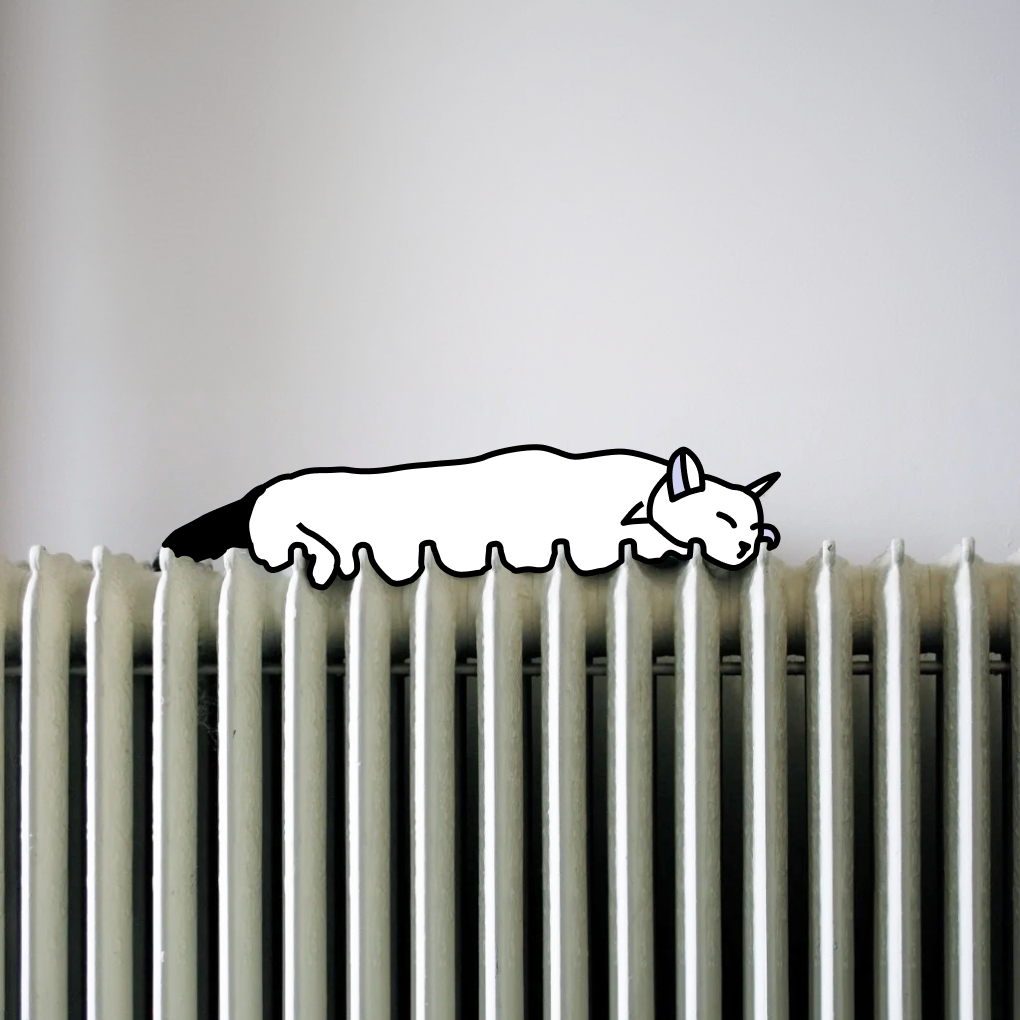Air source heat pump radiators
Air source heat pumps generally run at lower temperatures than gas boilers. They therefore need to diffuse heat over a larger surface area. If you’re replacing a traditional heating system you may need to upgrade your radiators, depending on which ones you have installed.
Introduction to air-source heat pumps
Air source heat pumps heat your house in a much more efficient way than traditional gas boilers. They do this by transferring ambient heat from the outside air into your home. This works rather like a fridge in reverse.
Although air source heat pumps do use some energy in transferring this heat they are incredibly efficient. They consume up to 3.5-5 times less energy than they produce. A traditional gas central heating system for example typically consumes 10% more energy than it produces.
There are two types of air source heat pumps – air-to-water systems and air-to-air. Air-to-air systems work a little bit like air conditioners in reverse. They distribute hot air to your house directly through fans. They do not need radiators at all but are best suited for modern open plan homes where the hot air can circulate over a large surface area. An advantage of an air to air system is that it can deliver cold air in the summer months.
Air-to-water systems (water heat pumps) are the most common in the UK. They are similar to traditional central heating systems. Heat is circulated in the house via water pumped through radiators. But instead of burning fuel directly to heat the water, a heat pump transfer the heat from outside the home to inside.
You only need to be concerned with air source heat pump radiators if you are installing an air-to-water system. If you are looking for a system that can deliver
Air source heat pumps and radiators
Although they can run hotter, a typical gas boiler will run at a heat output of 65° centigrade. This means it will circulate water at 65°C throughout the radiators in your home. Some air source heat pumps can run at 65°C. But they don’t tend to be very efficient at that temperature. You’ll get much better results by running them at 40°C to 45°C.
Standard radiators are designed to run at a heat output of around 65°C. When you install a heat pump, the the water inside the radiator will be around 25% cooler than with a traditional boiler system. To get your house to the same temperature, the radiator needs to allow more heat convection. In short it needs to be more powerful than a traditional radiator system.
The good news is that there are now a number of low temperature radiators on the market. These are specifically designed to work with the low flow temperatures that a heat pump will deliver.
Do you need to change your radiators when installing an air source heat pump?
Sometimes but not always.
Many people think that when they take out a gas boiler and install a heat pump system in their home they will inevitably need to buy new radiators. This is sometimes true, but not in every case.
What many people don’t know is that engineers often over specify radiators when installing gas systems. They put in oversized radiators that are more powerful than necessary. The logic goes that it’s much better to err on the side of caution and install larger radiators. It’s easier to turn down the heating if the house if too warm than change the radiator if it’s too cold.
This is good news for us heat pump enthusiasts. This means that many existing traditional heating systems can be replaced with an air source heat pump without changing the radiators. You may not be in this lucky group, but it is more common that people suppose to already have the correct output characteristics.
Also note that some newer heat pumps are able to run at a higher flow temperature than traditional models. In some cases they are able to run at similar temperatures to gas boilers. Although these models do tend to be more expensive, it does mean that you may be able to pair them with conventional radiators. If you plump for one of these models you may not need to change your radiator system at all.
But if you DO need to change the radiators it might not be the end of the world. Let’s look at how the calculation is made.
Calculating the size of the radiator for your air source heat pump
The first thing you need to do is to figure out the BTU or Watts requirement of the room in question. BTU stands for British Thermal Unit and is a unit of energy which the UK and the US have adopted. Watts is a unit of measurement for power and is more international.
There are a number of calculators online that can help you do this. This one at Tool Station is our favourite. It takes into account the size of your room as well as the type of external and internal insulation you have.
There is a little bit of maths to get from the BTU/Watts requirement of the room to the final radiator spec. This involves a thing called a ‘Delta Rating’ indicated by the ∆ symbol. Put simply the Delta rating is the difference between the flow temperate of the radiator and the ambient room temperature. Thus for a flow temperature of 70°C and a room temperature of 20°C the Delta Rating will be ∆ 50.
∆ 50 is the standard for radiators sold within the UK. Under BS EN 442 radiators must be tested with a flow temperate of 75°C and a return temp of 65°C with an ambient temperature of 20°C.
As we mentioned earlier in this guide, a typical air to water heat pump runs at a flow temperature of between 35°C and 55°C. As the power of most radiators is quoted at ∆ 70 this means you’ll have to do some conversion to figure out what suits your project. The conversion is detailed in the table below:
| ∆ T at 50°C | Conversion Factor |
| 60°C | 1.280 |
| 55°C | 1.154 |
| 50°C | 1.000 |
| 45°C | 0.895 |
| 40°C | 0.767 |
| 35°C | 0.657 |
| 30°C | 0.543 |
| 25°C | 0.433 |
| 20°C | 0.328 |
| 15°C | 0.229 |
Let’s look at an example.
Let’s say you need 2000 Watts to heat your room. You also know that your heat pumps runs at a flow temperate of 50°C. 50°C minus an ambient room temp of 20°C gives you a delta of ∆ 30.
You find a radiator that a radiator that produces 2000 Watts of power at ∆ 50. By using the table you can determine that at 30°C this same radiator will produce 1086 Watts of power (2000 Watts x 0.543). This will not be enough for your room. In fact, to adequately heat your room you will need two of these radiators or one radiator that produces 3683 Watts at ∆70 (2000Watts divided by 0.543).
The best radiator for air source heat pumps
As a rule of thumb, the classic steel or cast iron radiators that you find in UK homes are not the best choice. Aluminium radiators are much more effective. They heat up rapidly and transmit heat into the room much more quickly. They make a great choice for air source heat pumps.
Aluminium is also a great choice for homeowners looking to reduce their environmental impact. They can be manufactured from recycled materials and recycled again after they have reached the end of their life.
Fortunately there are some beautiful aluminium radiators around, with many designs to choose from. So if you do need to change your radiators, you are bound to find something that you like.
It’s generally the best option to go for double or triple panel radiator, rather than the old school single panel models. These are more suitable for a heat pump’s lower flow temperature heat.
What about underfloor heating?
Many homeowners love underfloor hearing. It provides a gentle ambient heat and means that you don’t need to take up wall space with radiators. As an underfloor heating system distributes heat over a large area, it works beautifully with air source heat pumps.
The problem is that in an existing house, putting in underfloor heating is a big undertaking.
If you’re doing a full renovation on your house it might be worth considering. And of course, if you’re building a house from scratch then it might be a no brainer.
Will I have to improve the insulation in my house?
Possibly.
Many older homes built in the UK prior to the 1970s are poorly insulated. Without making some upgrades to the energy efficiency of their houses, property owners may find they have performance issues with heat pumps – even with the ‘correct’ radiators installed.
We’ve written about this more extensively on the site. But depending on the age of your home, you may need to upgrade the insulation on your outside walls, loft, windows and doors. A good heat pump installer, will be able to run some heat loss calculations and advise you of the best solution. But do bear in mind that any insulation upgrades can add to the cost of the project significantly.
Is there a government grant available to change my radiator system?
In recent years, the UK government has announced it’s commitment to tacking carbon emissions. With the Boiler Upgrade Scheme it is now offering up to £7,500 towards the cost of an air source heat pump in England and Wales.
To qualify you must be replacing a fossil fuel heating system (such as oil, gas or electric). You must have a valid EPC certificate for your property. And crucially the EPC must have no recommendations to install loft of cavity wall insulation. This means that if your home requires this kind of upgrade, you will need complete this work before applying for the grant.
For more information on the types of funding available please check out this section of our website.

